Fiction reflects reality in HBO’s “The Sympathizer,” in a way that feels both eerie and timely, where a young anti-war journalist reports on the effect of a war on innocent children and families. Alan Trong who plays Sonny, says the one person he was mostly in fear of watching the show was his mom. Having left Vietnam by boat in the ‘80s, she watched the show for the first time and was markedly shaken up.
“She was like, 'I don't cry during movies.' She's very Vietnamese, but she cried during this,” Trong tells me in a Zoom interview.
As someone born and raised in Seattle, Trong lamented that American textbooks would often summarize the Vietnam War in a brief paragraph and conveniently leave out the effect the war had on Vietnamese civilians and refugees. “The more and more conversations that I have with non-Vietnamese people, the more I don't blame them [for not knowing],” Trong says. “People just don't know how our parents came here. It was never in any of our curriculums to know about this.”
But now all of that changes for the next generation with “The Sympathizer” which aims to depict the story of Vietnamese refugees in America post-1975, from their side. Inspired by the real-life Vietnamese American journalists who opposed the Vietnam War in the 1960s to 1980s, Trong’s Son Do, nicknamed Sonny, is an investigative reporter who edits a newspaper that serves the Vietnamese American community. Similar to how the character is written in the novel of the same name by Pulitzer Prize-winning author Viet Thanh Nguyen, Sonny left Vietnam with the goal of one day returning with his education to help liberate the country from the United States. While studying in California, he led a group of Vietnamese anti-war students in monthly discussions at his college, which is wheen he befriended the Captain (played by Hoa Xuande).
When Captain returns to California after the fall of Saigon in 1975, he reunites with Sonny, who is revealed to have never left America since his student days. Where the Captain is sort of a calmer, morally ambiguous character intent on survival – striking a delicate, tenuous balance between the Southern Vietnamese refugees and his communist higher-ups – Sonny is a passionate, naked leftist, eager to solicit a direct quote or debate his opponent’s inconsistencies for his newspaper.
"He’s just so frustrated with hearing about his people, kids and families that are being killed that have nothing to do with the war."
Their relationship begins to clash when Sonny becomes entangled with Captain’s former lover, Sofia Mori (played by Sandra Oh), and when he starts to report on the General’s (played by Toan Le) grassroots, anti-communist military group, garnering him suspicions as a potential Viet Cong communist mole. At the same time, Sonny’s self-confidence begins to falter when Captain calls him out for his role in the Vietnam War effort, or specifically his lack thereof, leading to a violent debate and confrontation in Sunday's episode.
Trong is currently co-starring in the Broadway play “An Enemy of the People,” with "Succession" star Jeremy Strong in New York City. In the Henrik Ibsen play, a man dares to publicly expose the hypocrisies and truths of his society and is punished for it. Even Trong found similarities between his current work and “The Sympathizer,” sharing how in both works, “people don’t really care about the people in the middle.” In other words, the people who get stuck in the crossfire deserve to have their stories told. Likewise, while chatting, I couldn’t help but bring up how Sonny’s fictional student journalism in the show mirrors the current real-life student reporting on the university protests against the Palestinian genocide, both of which have received backlash.
Trong sat down with me to discuss Sonny’s arc and the parallels between the show’s political messages and the current student campus protests.
The following interview has been lightly edited for length and clarity.
Did you read the book before or after getting the role of Sonny?
I read the book eight to nine times. People don't know this, but Hoa [Xuande] and I auditioned for the Captain. I never read anything for Sonny. It was all just for the Captain. They flew me to Korea for the first screen test. And there were certain directions that [Director Park Chan-wook] would give me on certain scenes where I'm like, the Captain wouldn't do that. He's an emotionally repressed kind of character. Looking back on it now, I'm pretty sure early on he knew that he wanted me as Sonny instead. But yeah I had read the book to just prepare for this. It was surprisingly informative for me, as someone who was born and raised in Seattle. It sounds weird to even say it out loud, but as a Vietnamese person, I just didn't really know a lot about my history.
I read that Sonny from the novel was a character loosely inspired by real-life Vietnamese American journalist Duong Trong Lam, who reported on anti-war activism and was assassinated in San Francisco in 1981 at 27 years old. Did you take any inspiration from this real-life journalist when prepping for the role?
Yeah, absolutely,1,000%. I didn't know that Sonny's character was written based on Lam Duong. We share the same middle name, which is Trong. It's so crazy. I [spoke with] Viet Thanh Nguyen at the longevity party scene [in the show] because he had his little cameo there. He had told me that when he was writing Sonny there were parallels between the character and Duong Trong Lam. It's the historical fiction adaptation of that, literally. There’s the PBS Frontline documentary that's great about the Vietnamese journalists from 1981 until 1990 who were, as they would say, assassinated in America. Not a lot of that is in the script story-wise, but some parallels that helped activate a feeling of self-righteousness, anger, protectiveness, empathy, melancholy and guilt of maybe [Sonny] could have done something more. I could have done more to save my people. That's kind of the thing that drove Sonny.
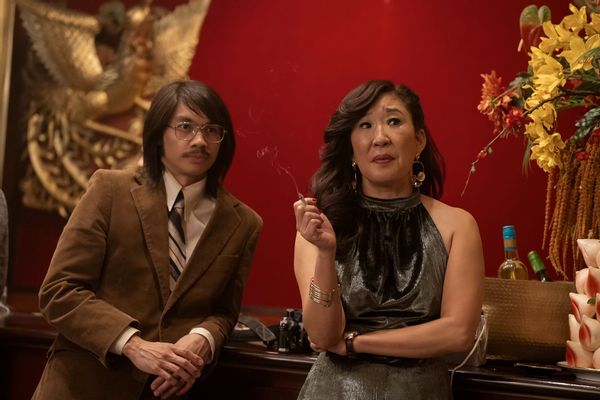 Alan Trong and Sandra Oh on "The Sympathizer" (Beth Dubber/HBO)Let’s talk costume, hair and makeup. I read that Sonny’s look was partially inspired by another journalist, Rolling Stone American rock journalist, Ben Fong-Torres, from the 1970s. How did Sonny’s appearance inform your performance? How much preparation and research went into Sonny’s look?
Alan Trong and Sandra Oh on "The Sympathizer" (Beth Dubber/HBO)Let’s talk costume, hair and makeup. I read that Sonny’s look was partially inspired by another journalist, Rolling Stone American rock journalist, Ben Fong-Torres, from the 1970s. How did Sonny’s appearance inform your performance? How much preparation and research went into Sonny’s look?
When I was doing “The Sympathizer,” I had a buzz cut. We were looking for a wig for a long time. I had sent photos of Ben Fong Torres. There’s a documentary that came out about him during the ‘70s era. What you see in the show is [Torres’] swoosh. And it's crazy because if you go back to the other documentary [I mentioned], that's the exact hairstyle that [Duong Trong] Lam had when he first came over through the American Field Society, which sponsored the students to study in America. There’s a photo of him in black and white. I was really geeked out. We didn't even plan that.
What do you think are Sonny’s primary character motivations as a journalist in the post-Vietnam War, post-1975 era? What did he feel was his responsibility?
You see this in Episode 2. I was really nervous about being in Hoa’s face like that, but Director Park was like, '\"Just trust me on this. Just go in with full conviction in what you're saying. Almost cross the line right away. Then that way you can mask any guilt you have of, maybe you didn't do enough to stop this war." Because the Captain went back during the war, and Sonny stayed in America. Sonny will never admit this, but later on in the story, he feels like a poser and like he's not doing enough. Those types of human beings, whether they're journalists or not, it's an interesting human study. It's like, why are you acting with so much gravitas? It's because there's probably something under that that you're trying to cover up. And that was really interesting for me to play with.
In the novel, Captain describes Sonny as a very radical leftist character. He has communist sympathies in the same way that Captain is a sympathizer for the refugees in America. So I was curious, in your opinion, what communist beliefs does Sonny believe in? Any beliefs he disagrees with?
Can I read you something? This is kind of in that world. This isn't in “The Sympathizer,” but there was a quote from [Duong Trong] Lam that he had when he was getting a lot of criticism for being a communist where he goes, “If you think I'm a communist, then prove it.” Journalists love to stir things up like that. It's fun for them. That was very helpful for me to make this guy human. Lam was not only a journalist but he also ran the VYDC, the Vietnamese Youth Development Center, which helped refugees with legal jargon for the Department of Social Services. If you're doing something that specific, then that means you care about your people. And it doesn't have anything to do with politics necessarily. A lot of the criticism that Lam was getting there was: one, they thought he was too young. Two, they thought he was too liberal. And three, they thought he was too Americanized. These are things I can relate to on a personal level that's like, why don't you take me seriously?
"When you look at journalists who have been assassinated, there are a lot of cases where there was never justice."
To be further honest with you, I never put myself in a headspace of “I'm a communist” when I was playing Sonny. I would focus on printing photos of children from that era and listening to Trinh Cong Son, the Bob Dylan of Vietnam. These are songs of poetry where he's painting a picture of mothers sweeping the front of their yard, and then next thing you know it's getting bombed and then she doesn't have a yard anymore. That's what was activating for me.
Can you break down Sonny’s emotions leading up to that shocking scene in Episode 6 when he gets assassinated by the Captain?
It’s so funny, my family was like, “So do you die in it? Are you gonna die?” Because I die in everything I’m in. I’d say fear. Guilt. Loss of connection with another person who is my age and looks like me. Unexpressed grief. Franticness. Frustration that we couldn’t communicate effectively. I remember shooting some stuff in Episode 5 where there were moments where Sonny’s obviously poking at the Captain. I look at the Captain and think, is there a world where we could be family or friends? Are we actually on the same page here? Because this war s**t is really lonely. Hoa’s a great scene partner. You see so much behind his eyes, saying, "Can we be together in this? Does it have to be like this?" A lot of unexpressed stuff. I think that the ripple effect on the Captain for the deaths of Sonny and the Crapulent Major is that these are things that he didn’t want to do. Guilt. I think the Captain in the second half of the book and show, he’s living through a state of perplexion and confusion because two ghosts keep on haunting him.
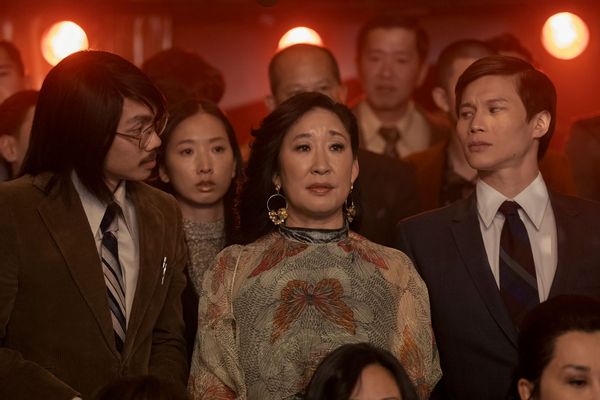 Alan Trong, Sandra Oh and Hoa Xuande on "The Sympathizer" (Beth Dubber/HBO)Why do you think that the war in Vietnam became such a flashpoint at that time?
Alan Trong, Sandra Oh and Hoa Xuande on "The Sympathizer" (Beth Dubber/HBO)Why do you think that the war in Vietnam became such a flashpoint at that time?
We’re living in such a different time with social media now, but back then, thanks to these brave journalists, there were physical representations of civilians being massacred, innocent families. That is the reason I think why it sparked. And as you see why it’s sparking so much right now because you see people who have nothing to do with politics, nothing to do with an agenda, a regime, anything, they’re just trying to find grains and rice for their kids. I think there was a statistic from a panel that Viet Thanh Nguyen did at either Harvard or Yale, where he said there were approximately 58,000 American soldiers who died in the Vietnam War. But there were 3 million Vietnamese that were massacred or didn't make it out. And then other additional millions in Laos and Cambodia, which many people don't even know about.
There’s a line in the play I’m in right now called "An Enemy of the People" that gets a rumble of laughter every night thanks to Amy Herzog, our playwright. Also, Henrik Ibsen. But the line is, "In America, we wouldn't have to worry about anything like this." And it gets a rumble of laughter every night. Sometimes I'll be backstage listening to that laughter before I enter the stage. And I'm like, wow, this is kind of heartbreaking in a way that thousands of people are able to relate and recognize this pain that in America, we feel completely lost in leadership and empathy and these things. And that's why the joke hits so hard. And that's like watching Episode 4 of “The Sympathizer,” there were so many moments where I would just be laughing so hard. But then after the laughter, I'd be like, "Damn, I feel kind of sad inside."
Do you think there are any similarities between the conflicts and motivations that Sonny navigated in the show with what’s currently going on right now with the student campus protests sweeping the nation?
If anybody follows Viet Thanh Nguyen on any social media, you’ll see that he’s attending a lot of these protests. He used to do it when he was younger as well. Of course, there are parallels. Yeah, of course. Going back to the feeling of frustration that Sonny had, at a certain point, he’s not taking a clear political side. He’s just so frustrated with hearing about his people, kids and families that are being killed that have nothing to do with the war. That’s why people are protesting. There was this other thing I saw from my favorite poet Ocean Vuong. He was saying something along the lines of, "I can’t believe I’m living in a time where it’s a crazy idea to stop killing children. It’s like what are we living in right now?" This is not really a political thing. It’s like a human thing. At least what I’m talking about and what Sonny is talking about. But of course, there are parallels.
In the play [I’m in], Petra who’s the daughter, sits down and goes, . . . something along the lines of, "I hate that I feel this way. I keep on having this thought that they deserve what comes to them." Dr. Stockman, who is played by Jeremy Strong, whose character has every human right to be cynical, to be like, you’re right. F**k those people. Yet he’s kneeling down and he goes, "We shouldn’t think like that. In a few years, I’m going to be gone. You’ll be gone. But your little brother will still be here and the truth will be told." The through line of the play is that we just have to imagine. It hits every night. Part of me has avoided looking at [the news], because I’m just so sensitive to it. Because this happened with Vietnam too.
Do you think Sonny views the act of the protest and its ability to create change in a pessimistic or optimistic light? Or do you think maybe he started out viewing it one way and then by the time he died, he viewed it in another way?
I don’t think anything is ever linear. With Sonny, I think it fluctuates. People will call him a poser and he feels like a poser himself. He feels like a complete fraud. I think a person like that has to have high feelings of pessimism. You can only feel that when you’re alone when you come home to your apartment. The moment you walk out, you act all, "I’m confident, I’m convicted in my power." That’s how I felt playing him. Let’s fake it til you become it, you know? Sonny loses hope over the course of the show whether he shows it or not. That’s why you see him getting frustrated with the Captain. Perhaps pessimism and cynicism are a byproduct of that frustration with the Captain. He looks at the Captain and he’s like, "You are somebody that can absolutely help this cause. And you’re choosing not to. Like the war is over. What the f**k are you doing? You know this is not right."
How does the character of Sonny reflect the legacy and impact of Vietnamese journalism, student journalism or even Vietnamese student journalism in the U.S.? Any combination of those.
That’s a great question that I don’t know if I have the answer to. When you look at journalists who have been assassinated, there are a lot of cases where there was never justice. I’m not an activist. I look and I observe the situation I see. This is a show with some parallels to that. I don’t know if it’s even my place to answer that, because I’m not family of these victims, because that’s what they are. I really hope that having Sonny’s character written as a character contributes to some way of showing that somebody tried, you know? I’m being super vague, but with the kind of things that we’re living through today. These students are trying. Whether there’s something that comes out of it or not, they’re trying to stop the war or bring attention to a specific region of a country, to stop military funding. That’s what Sonny was trying to do in the story. He’s a representation of the anti-war movement.
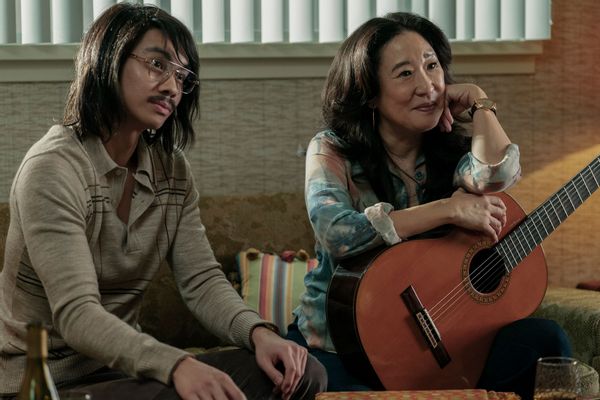 Alan Trong and Sandra Oh on "The Sympathizer" (Hopper Stone/HBO)
Alan Trong and Sandra Oh on "The Sympathizer" (Hopper Stone/HBO)
You’ve made it to “The Sympathizer” and you’re working with heavyweights like Sandra Oh, Robert Downey Jr. and Director Park Chan-wook. What was that like?
It’s like a masterclass, honestly. I don’t really have scenes with Robert, but he’s just been a supporter. He and [his wife] Susan came to see [“An Enemy of the People”]. He and Jeremy Strong did a movie called “The Judge,” which I really recommend to anybody who hasn’t seen it. That movie is one of my favorites. But Robert’s been supportive of not just me, but everybody. He’s aware of what self-esteem is. Sometimes we as humans need a little boost. He’s like, "Hey, just want to remind you how dope you are." He has that understanding of human behavior that’s like a real leader.
Sandra is an effortless scene partner. I think all of us hope to evolve into someone like that, someone who is questioning everything openly in a non-combative way. Just a very, "I’m holding responsibility for my function in this story." The level of care that’s put into everything. It was dope to see an experienced, very seasoned Asian female actress who has so much power in her body and conviction in her creative choices.
Speaking of seasoned Asian American and Asian female actresses. Because I’m somebody who grew up watching “Paris by Night,” what was it like getting to work with Vietnamese legends Nguyen Cao Ky Duyen and Kieu Chinh?
[Laughs] Ky Duyen must get this all the time from our generation. "Oh my god, we used to watch you at karaoke parties!" It’s just weird. It’s like, "Whoa! Aren’t you the emcee of that one show?" That’s crazy. Like my uncles were so lit off of Heineken, Cognac and f**king Macallan and there’s belligerent music blasting. This is Seattle for me, and I’m watching "PBN" on VHS tapes. It’s like, [to Ky Duyen], "That’s you, isn’t it?" [Laughs]. I didn’t really have any scenes with her, but we were together a lot.
My Ba Ngoai was telling me about Kieu Chinh. I really had to catch up with Vietnamese cinema. And I finally watched "Journey from the Fall" (2006), which starred Kieu Chinh. Which is an amazing film. Oh my god. To be honest, I wasn’t too familiar with it. But as my Ba Ngoai was telling me, she’s like earlier generation. She did all those movies. I felt so honored to be working with them both.
What was the dynamic like working with the other actors on “The Sympathizer”? Was it cool to get to work with a mostly Vietnamese cast?
Oh, I can’t stand them. I can’t stand them. [Smiles]. I mean, no, it’s hard to not get close, you know? You’re completely thrown into this thing that’s so nerve-wracking, joyful, fulfilling and stressful. You have to lean on each other. Vy [Le], who plays Lana, is from Nha Trang, but she went to a boarding art school in Boston. So her Vietnamese is on point. But I feel like the more she hangs out with us, her Vietnamese gets s**ttier and s**ttier. We have that broken, five-year-old Vietnamese, you know? Then there’s Fred [Nguyen Khan], who’s from Montreal. Hoa is from Australia. I’m born and raised in America. There are these three different diasporas. But at the same time, we have a shared sense of humor of not feeling like we belong. We traveled together in Thailand and we went to Vietnam afterwards. We spent a month there just to get away and eat and drink. And we went to these gay clubs in Saigon, which I had no idea even existed. Yo, Saigon is getting progressive. When I would travel with my dad to Vietnam, I was always told that this is what Vietnam is, but until I went on my own as an adult and experienced the country for myself, I was like, yo, this is actually not what my dad told me it was.
Yeah, it’s because [our parents] left at a very specific time. I think Vietnamese Americans, who don’t visit the motherland often, or who just get their information from their parents, get information that is stuck in time. We’re told Vietnam is conservative, that it’s very homogenous. But when you start to craft your own relationship to Vietnam as an adult, outside of your family, you realize that Vietnam is very diverse. They’re actually much more open-minded than you think they are. And it’s because they’re humans and not just quote-unquote Vietnamese people that we’ve been told growing up. I’m really glad that you and the cast got to experience that after the shoot.
That was so beautifully said. I’m definitely a Saigonese kind of guy.
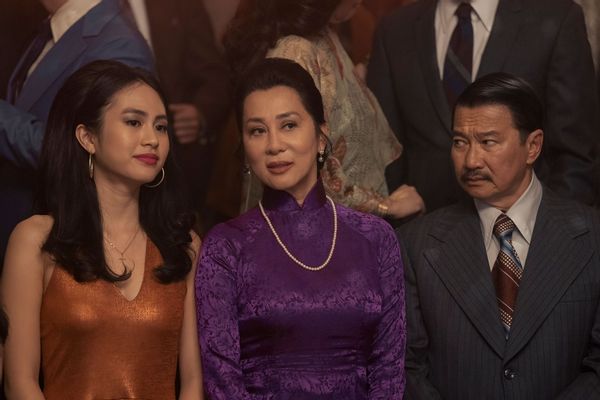 Vy Le, Ky Duyen and Toan Le on "The Sympathizer" (Beth Dubber/HBO)You’re in a play on Broadway right now called "The Enemy of the People.” Congratulations. What has that experience been like for you? What’s it like working with Jeremy Strong?
Vy Le, Ky Duyen and Toan Le on "The Sympathizer" (Beth Dubber/HBO)You’re in a play on Broadway right now called "The Enemy of the People.” Congratulations. What has that experience been like for you? What’s it like working with Jeremy Strong?
It’s the best acting job I’ve ever had in my life. 1,000%. There’s no contest. I’ve never done theater, like a real play. I did a small musical as a background character and some stuff in community college. But I’ve never done a real drama play on stage. It’s so fulfilling. I have so much gratitude for even being able to be a part of something like this. Because it’s like I kind of feel like I’m relearning how to act. It’s like free education.
Jeremy Strong is . . . there’s a reason why he’s nominated for a Tony. He’s different every night. He cares a lot about what he’s doing. I share similar sentiments of feeling that the space is sacred and somehow almost being drawn to this dangerous element of theater. There are moments when we think, why did we sign up? Like this is crazy. There are nights when the nerves start kicking in because of certain circumstances. But then we enter the stage anyway, and it’s a lot smoother than I thought it was going to be.
Want a daily wrap-up of all the news and commentary Salon has to offer? Subscribe to our morning newsletter, Crash Course.
Your character Sonny in “The Sympathizer” has a calling when it comes to his profession. Do you feel similarly, that you have a particular purpose as an actor?
Yeah, 1,000%. I have a little brother. I feel like not only him but there's a lot of younger Vietnamese kids who may or may not have access to a role model. Now we're talking about representation and all these cliché things, but it's important to me. Because when I was growing up, I never felt sexy. I never felt like I was allowed to cry, that I was allowed to be scared of something, that I was allowed to be self-righteous about something, that I was allowed to be petty if I wanted to be petty. It's a very common thing in our culture, you know? I remember what it was like to want to date a white girl because that was what made me feel powerful. This sounds kind of self-important, but at times it does feel like, “Well s**t, I'm lucky enough to get this far.” I would like to keep on being selective about what I do and being curious and checking in on my humanity so that my little brother or somebody that is under 10 years old can see me. If I would have known that I could be more than enough through watching movies, it would have saved me at least a lot of pain and self-doubt as I was coming into adulthood.
"The Sympathizer" airs Sunday nights on HBO and streams on Max.


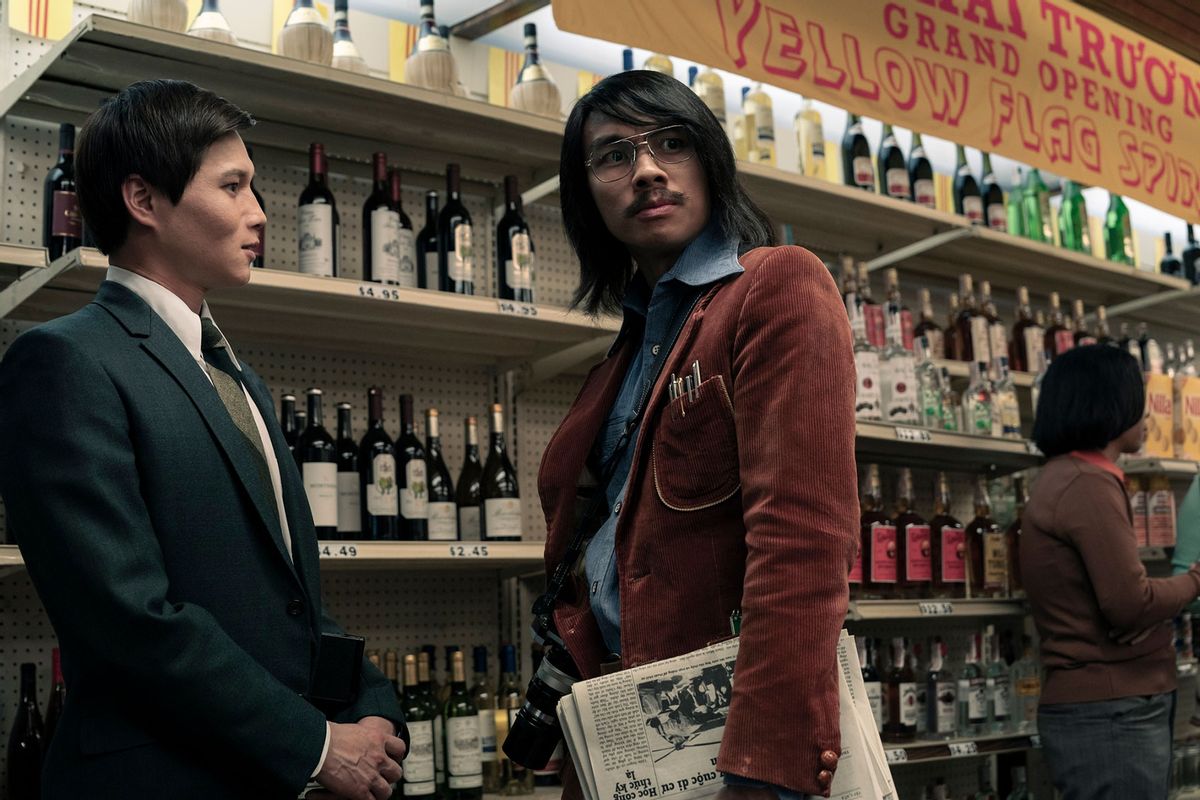
Shares